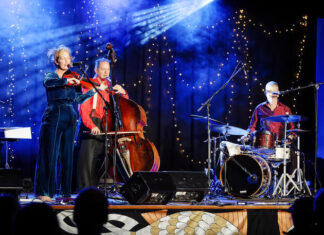ERIN PEARSON
PEDESTRIANS are risking their lives dodging traffic after Torquay’s St Therese Catholic Church stopped neighbours walking through its grounds, according to a resident.
Tamba Rose said she was concerned someone would be injured unless access between Sarabande Cres and Surf Coast Hwy was reinstated.
Ms Rose has petitioned council to investigate forcing St Therese church to reopen its land to Church Estate residents.
Roman Catholic Trust redeveloped the church site in October to cope with increased demand, fencing off part of the site to pedestrians.
Ms Rose said Church Estate residents had walked through the land for “decades”.
“Because the access has been fenced off we’re now forced to walk across uneven ground and around large trucks at the rear of unlit shops to get to Surf Coast Hwy where our children catch buses and access playgrounds,” she said.
“It’s dangerous for our kids and elderly people down here who have relied on the footpath through the church ground for as long as we can remember.
“We just want the fence opened up so our kids can get to school and our elderly residents access public transport safely.”
Council received Ms Rose’s 83-signature petition earlier this year but deferred the matter at its July council meeting for an investigation of three potential solutions.
The options were: legal acquisition of the walkway under “long-user rights”; financial acquisition; or upgrading alternate access between the Sarabande Reserve and Rocklea Drive.
St Therese Parish priest Father Linh Tran said the church believed public access rights were non-existent.
“St Therese Church in Torquay was redeveloped to better provide for the ever-growing local worshipping community of Torquay and to better extend hospitality to the many visitors we have over holiday periods,” Fr Tran said.
“The redevelopment was carried out in consultation with council and in accordance with council requirements.
“St Therese views with great importance preservation of the entire site for changing needs. The land is private land and we do not believe any public access rights exist.”
Church access ‘anger’
Digital Edition
Subscribe
Get an all ACCESS PASS to the News and your Digital Edition with an online subscription
Community grant recipients announced
The City of Greater Geelong has announced the 78 recipients of a funding pool of $772,131 for its latest round of community grants.
Awarded by...








